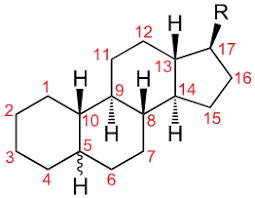Steroids, commonly referred to as corticosteroids, have long been an essential component of medical treatment across various specialties. These powerful medications, derived from the natural hormone cortisol, serve a multitude of purposes in patient care. In the United Kingdom, healthcare professionals frequently prescribe steroids to alleviate symptoms, manage chronic conditions, and promote overall well-being. In this article, we will explore why patients may be given steroids and highlight the positive impact they can have on individual health and quality of life.
I. Steroids for Inflammation and Allergic Reactions:
Steroids are commonly prescribed to patients dealing with acute inflammatory conditions such as bronchitis, sinusitis, or skin reactions. These medications possess potent anti-inflammatory properties, which help to reduce swelling, redness, and pain associated with these conditions. Moreover, in cases of severe allergic reactions, such as anaphylaxis, steroids can play a crucial role in preventing life-threatening complications by suppressing the immune response.
II. Steroids in Chronic Conditions:
- Asthma Management: In the United Kingdom, asthma affects millions of individuals, and steroids are often prescribed to manage the condition effectively. By reducing airway inflammation and constriction, steroids help to alleviate asthma symptoms and enhance lung function. They are commonly administered through inhalers or oral medications, allowing patients to lead active and fulfilling lives.
- Rheumatoid Arthritis Treatment: For patients suffering from rheumatoid arthritis, a chronic autoimmune disease, steroids offer relief by reducing joint inflammation and pain. By suppressing the immune response, steroids can slow down the progression of the disease and improve overall joint function, allowing patients to maintain mobility and quality of life.
- Autoimmune Disorders: Steroids are frequently prescribed for various autoimmune disorders, including lupus, multiple sclerosis, and inflammatory bowel disease. These medications help to suppress the immune system’s overactivity, alleviating symptoms and preventing further damage to affected organs.
III. Steroids in Organ Transplantation:
- Preventing Organ Rejection: Following organ transplantation, patients are prescribed steroids to prevent rejection by suppressing the immune system’s response to the new organ. By reducing inflammation and immune activity, steroids help to ensure the successful integration and functionality of the transplanted organ.
- Preserving Transplanted Organ Function: Steroids are also used to maintain the function of transplanted organs over the long term. By reducing inflammation and preventing damage caused by immune responses, these medications can contribute to the longevity and success of organ transplantation.
IV. Steroids for Dermatological Conditions:
- Treating Severe Skin Inflammations: In cases of severe skin inflammations, such as eczema flare-ups or allergic reactions, steroids are often prescribed topically or orally. They help to relieve itching, redness, and swelling, allowing the skin to heal and restore its natural balance.
- Managing Chronic Skin Conditions: Chronic skin conditions like psoriasis and lichen planus can greatly impact a patient’s quality of life. Steroids play a crucial role in managing these conditions by reducing inflammation, controlling symptoms, and preventing flare-ups.
V. Steroids in Cancer Treatment Support:
- Reducing Inflammation Caused by Cancer: Cancer treatment, including chemotherapy and radiation therapy, can induce inflammation and immune responses that contribute to discomfort and side effects. Steroids are commonly used as supportive care to minimize these effects, allowing patients to tolerate and complete their cancer treatment more effectively.
- Alleviating Chemotherapy-Induced Side Effects: Steroids can help manage and reduce side effects caused by chemotherapy, such as nausea, vomiting, and allergic reactions. By minimizing these adverse effects, patients can experience improved well-being during their cancer treatment journey.
VI. Steroids in Hormone Replacement Therapy:
- Managing Hormonal Imbalances: Steroids, in the form of hormone replacement therapy, are used to manage hormonal imbalances in various conditions, such as adrenal insufficiency or hypopituitarism. By supplementing deficient hormones, these medications help restore balance and alleviate symptoms associated with hormonal imbalances.
- Supporting Adrenal Insufficiency: In cases of adrenal insufficiency, where the adrenal glands fail to produce sufficient cortisol, steroid replacement therapy is essential for maintaining proper bodily functions and well-being.
Conclusion: In the United Kingdom, steroids play a vital and positive role in patient care across multiple medical specialties. From managing acute inflammation to supporting chronic conditions, organ transplantation, dermatological conditions, cancer treatment, and hormone replacement therapy, steroids contribute significantly to improving patients’ health and overall quality of life.
Through their anti-inflammatory and immunosuppressive properties, steroids help to alleviate symptoms, control diseases, and provide much-needed relief to individuals dealing with various health challenges. As healthcare professionals in the UK continue to leverage the benefits of steroids, their appropriate use ensures optimal patient care and better health outcomes across the nation.
FAQs
Q: What conditions are steroids commonly used for inpatient care?
A: Steroids are commonly used for a range of conditions, including acute inflammatory conditions, severe allergic reactions, asthma, rheumatoid arthritis, autoimmune disorders, organ transplantation, dermatological conditions, cancer treatment support, and hormone replacement therapy.
Q: How do steroids help in managing acute inflammatory conditions?
A: Steroids have potent anti-inflammatory properties, which help reduce swelling, redness, and pain associated with acute inflammatory conditions such as bronchitis, sinusitis, or skin reactions.
Q: How are steroids beneficial for patients with asthma?
A: Steroids are commonly prescribed for asthma management as they reduce airway inflammation and constriction, leading to improved lung function and alleviation of asthma symptoms.
Q: What role do steroids play in the treatment of rheumatoid arthritis?
A: Steroids help manage rheumatoid arthritis by reducing joint inflammation and pain. By suppressing the immune response, they slow down the progression of the disease and improve overall joint function.
Q: In what ways do steroids benefit organ transplantation patients?
A: Steroids are crucial in organ transplantation as they help prevent organ rejection by suppressing the immune system’s response to the new organ. They also preserve the transplanted organ’s function by reducing inflammation and preventing damage caused by immune responses.
Q: How do steroids contribute to the treatment of severe skin inflammations?
A: Steroids, when applied topically or taken orally, help treat severe skin inflammations by relieving itching, redness, and swelling, promoting the healing process.
Q: Can steroids alleviate symptoms and side effects in cancer patients undergoing treatment?
A: Yes, steroids are often used as supportive care in cancer treatment to reduce inflammation caused by cancer and alleviate side effects of chemotherapy, such as nausea, vomiting, and allergic reactions.
Q: How do steroids help in managing hormonal imbalances?
A: Steroids, in the form of hormone replacement therapy, help manage hormonal imbalances by supplementing deficient hormones, restoring balance, and alleviating symptoms associated with conditions like adrenal insufficiency or hypopituitarism.
Q: Are there any potential risks or side effects associated with steroid use?
A: While this article focuses on the positive aspects of steroids in patient care, it’s important to note that like any medication, steroids do have potential risks and side effects. It’s crucial for patients to consult with their healthcare providers for a comprehensive understanding of the benefits and any associated risks specific to their individual circumstances.
Author

Dr. Aditya K. Sharma
I am Dr. Aditya Sharma, a dedicated urologist specializing in kidney transplants and advanced urological surgeries. My career is driven by a passion for delivering exceptional care and pioneering surgical techniques. Outside the operating room, I have a keen interest in studying the effects of anabolic steroids on bodybuilding, seeking to understand the fine line between enhancing performance and maintaining health.








